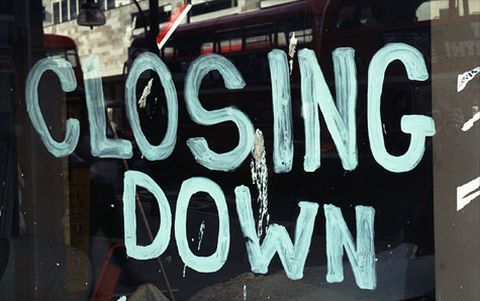
Everyone knows that most small businesses fail over time. There are a wide array of statistics on this, much of which conflict with each other. A standard trope is that eight or nine businesses out of ten fail eventually. More detailed analysis shows that only 50% of business fail after four years, but that’s skewed in the wrong direction because it includes things like franchisees, mergers, and already-successful business owners or companies/conglomerates starting second or third businesses.
What I’m talking about today is a single or small group of non-rich people starting a first-time business. The best stat I’ve read on that was one quoted by Bloomberg that stated eight of out ten entrepreneurs go out of business within 18 months. Based on other studies I’ve read and my own experiences in 25 years of working with small companies, that sounds about right to me.
I’ve already talked about what businesses do wrong and why they fail. Today I’m going to talk about why most individual entrepreneurs fail. It’s simply because they start the business wrong.
Do you know how most people start a business? It usually works in one of three ways:
1. The “I’ll Show You!” Guy
Some guy (or woman) suddenly gets fired from his job. He’s pissed off, and in a fit of anger, he says “I’ll show you! I’ll start MY OWN business! You’ll see, you’ll see!” Then with zero business experience, zero business education, and near-zero planning, he starts a first business, and, big shock, fails within 18 months. I have seen this happen repeatedly over the last 25 years.
2. The Irrational Passion People
Often it works like this instead. A person has a strong passion for something with zero market value, and starts a business. Not because their idea will make a lot of money, but because it’s something they want to do. I knew a woman once who loved drawing pictures of fish. So with zero market research and zero business know-how she started a business selling fish art. She rented out some commercial space, put up a bunch of pictures of fish, purchased an expensive point-of-sale computer system, inventoried a bunch of fish art, and then sat back and waited for the money to flow in. Big shock, she went out of business within six months, and lost most of her retirement savings.
Again, I’ve seen many, many people do things like this.
A huge percentage of first-time entrepreneurs don’t understand that just because you like something doesn’t mean there is a market demand for that thing. It’s likely impossible to make any real money selling that thing at a price you want to receive. Hey, I would love to just sit and write fantasy novels and short stories all day long and do nothing else. The problem is I would barely make any money, and I would be extremely unhappy. The same goes for 99.9% of poets, artists, musicians, and other art-based endeavors.
3. The Non-Marketers
Sometimes it works like this. A person with no business know-how and/or minimal planning starts a business, and he really does choose something with a viable market demand at a price people can afford and will be profitable for him.
However, he doesn’t spend very much time marketing or selling the damn thing. He thinks marketing and sales are “dirty” or “arrogant” or “embarrassing” or “beneath him” because he’s smart and has a college degree or something. So he works very hard on his widget and his web site and his delivery system and crap like that, but spends little time on marketing or sales. And, big shock, he goes out of business. I talk about the importance of marketing and sales in more detail in my Alpha Male 2.0 book.
If you add up the the angry “I’ll show you!” people, the passionate but irrational people, and the non-marketers, that is easily, and I mean easily 80% or more of first-time entrepreneurs who start a first-time business. No wonder most small businesses fail.
To show you the opposite example, here’s what I did when I started my first full-time business almost 20 years ago. The item I chose to sell was not necessarily my favorite thing to do, but a service that I knew for a fact was a high-demand item in the city in which I lived that could be sold for a price I wanted (it was I.T. consulting). I read over 600 business books to plan everything out before I started the business. I planned the business for two full years before I actually quit my job and went full-time with it. I kept my expenses very, very low. Once I got started, I focused very hard on marketing and sales even though I often hated doing it.
And, big shock, I never went out of business, and went from near-zero income to six figures in less than four years.
Businesses fail not because starting your own business is risky. It’s because the vast majority of people who start a business do it wrong.
Leave your comment below, but be sure to follow the Five Simple Rules.


No Comments